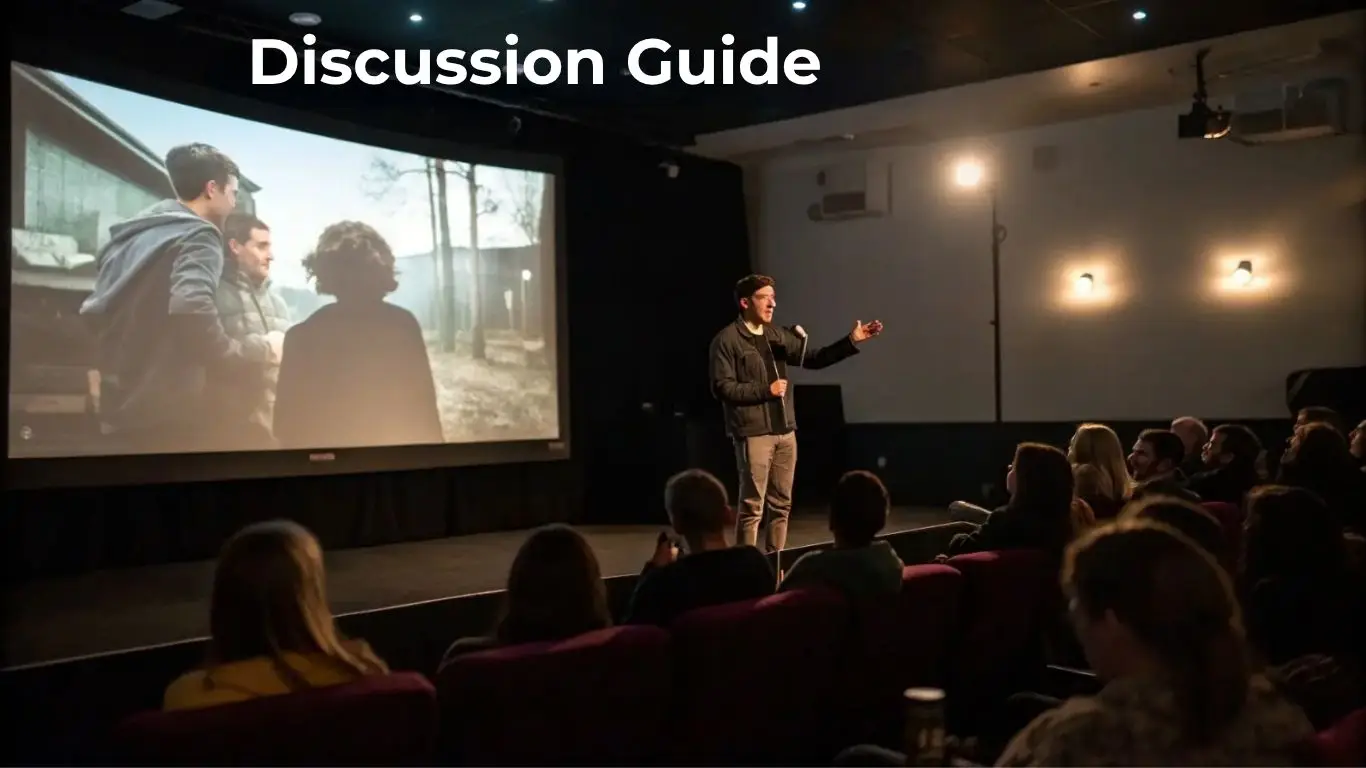
Welcome to the discussion guide for Becoming Interplanetary. This page helps you explore the film’s story, from our first creative moments to what life could be like beyond Earth. As you move through each section, you’ll find questions and stories about wonder, problem-solving, community, and our choices as explorers.
Whether you’re here to lead or join in, these questions are for everyone. Use them to connect the film’s ideas to your life, what you’re curious about, what matters to you, and what you hope for our world. Beyond curiosity and imagination, these prompts are designed to spark open, welcoming conversations that delve into the aspirations and the real challenges of creating a shared future in space.
As you discuss, reflect on which voices and experiences are highlighted in the film and which might be missing. Share not just your hopes and dreams, but also your concerns and the diverse realities faced by people worldwide, many of whom are not traditionally included in these conversations. Listen closely, encourage one another to bring new insights, and think together about what our future in space could and should look like. What does it truly mean to care for each other and our planet? How do we make room for all stories, not just those of a select few? Every voice counts, and these questions foster honest dialogue and surface perspectives that are often overlooked, ensuring everyone’s experiences and concerns matter.
Film Structure
Film Structure
Prologue: Why We Explore
We begin with a simple yet profound question: What calls us beyond the boundaries of comfort and necessity? The urge to explore lies deep within us, driving discovery, expression, and what it means to be human.
Act 1: The First Frontier – Art Before Words
Long before science or even language, humanity’s first explorations were told through art. From cave paintings to music, creativity was our original window to the unknown.
Featured art:
- A Trip to the Moon Georges Méliès, 1902
Act 2: Common Ground, Uncommon Challenges
Earth’s history of exploration is complex: filled with triumphs, mistakes, and lessons we cannot afford to ignore as we look to the stars. How can we find shared purpose amid difference?
Featured art:
- American Progress John Gast, 1872
- The Map of Hell Sandro Botticelli, mid-1480s-mid-1490s
- Nazca Lines Nazca Culture, 200 BCE – 600 CE
Act 3: Balancing Acts – Taking Meaningful Risks
Progress requires risk, embraced thoughtfully and responsibly. What does it mean to take creative and physical leaps for the sake of a better future?
Featured art:
- The Trail of Tears Robert Lindneux, 1942
Act 4: Ancient Wisdom, A Humble Path Forward
The cosmos has shaped every culture’s myths and meaning. What lessons from our past traditions and stories can guide us as we become an interplanetary species?
Featured art:
- Roden Crater: The South Space James Turrell, 2024
Act 5: Science Informs, Art Transforms
Science uncovers the universe’s mysteries; art imagines new ways of seeing and being. Together, they invite us to dream, and to build, a future beyond Earth.
Featured art:
- The Rosetta Stone Ptolemaic Dynasty, 196 BC
- Paradise Lost John Milton, 1667
Act 6: Beyond the Horizon – Changing What We See
Seeing the Earth from space reshapes our perspective. This “overview effect” challenges us to care for our planet and to reimagine our place in a vast, connected cosmos.
Featured art:
- Guernica Pablo Picasso, 1937
- Earthrise William Anders, 1968
Act 7: Space Art – A Cultural Canvas
Every culture has looked skyward and shaped its own story of the stars. Through space art, we express curiosity, hope, and what we value most about being human.
Featured art:
- Babylonian Star Catalogue Uruk Culture, 320-150 BC
- From the Earth to the Moon Jules Verne,1865
- Medinet Habu Mortuary Temple of Rameses III, c. 1186–1155 BC
- Ladder to the Moon Georgia O’Keeffe, 1958
- The Ancient of Days William Blake, 1794
- Astronomer Copernicus, or Conversations with God Jan Matejko, 1873
- Saturn as seen from Titan, Chesley Bonestell, 1944
Act 8: With Many, Fewer Missteps
Becoming interplanetary is not a solo endeavor. By including more voices, backgrounds, and perspectives, we stand a better chance of avoiding old mistakes and forging a better path.
Act 9: Earth – The Ultimate Mission
In all our journeys outward, Earth remains both our home and most precious responsibility. How we treat our planet and each other, defines our legacy in the universe.
Featured art:
- Pakal’s Sarcophagus, Mayan Culture, c. 683 CE
- Sagrada Família, Antoni Gaudí, 1882-2026
- The Starry Night, Vincent van Gogh, 1889
Facilitation Guide
Start the Conversation
As you explore Becoming Interplanetary, we invite you to reflect and discuss these three big questions at the heart of the film:
What drives humanity to explore, and how do art, science, and culture shape that drive?
How can we avoid repeating past mistakes and build a more just and sustainable future as we become interplanetary?
How might living beyond Earth transform our identity, responsibilities, and relationship with our home planet?
The questions below are designed to help guide open and welcoming conversations with your group, connecting the film’s ideas to real life while addressing critical gaps and missing perspectives. Use these prompts to invite everyone to share their feelings, memories, and hopes, not just about curiosity, creativity, responsibility, belonging, technology, identity, and dreams, but also about the diverse realities, challenges, and viewpoints that may not be represented in the film. Encourage participants to reflect on whose voices or experiences might be missing, to listen closely, and to add to each other’s insights. Think together about what our future in space could and should look like, what it means to care for one another and our planet genuinely, and how to create space for all stories, not just those of the few. These questions are intended to spark honest dialogue, surface diverse perspectives, and ensure everyone’s experiences and concerns matter.
Facilitation Tips:
Encourage participants to name their standpoint; ask “How might someone from a different background — class, culture, region, historical experience — see this differently?”
Explicitly prompt for what is missing or overlooked after each section.
Foster safety for disagreement, critique, and discomfort, leading to deeper learning and more inclusive dialogue.
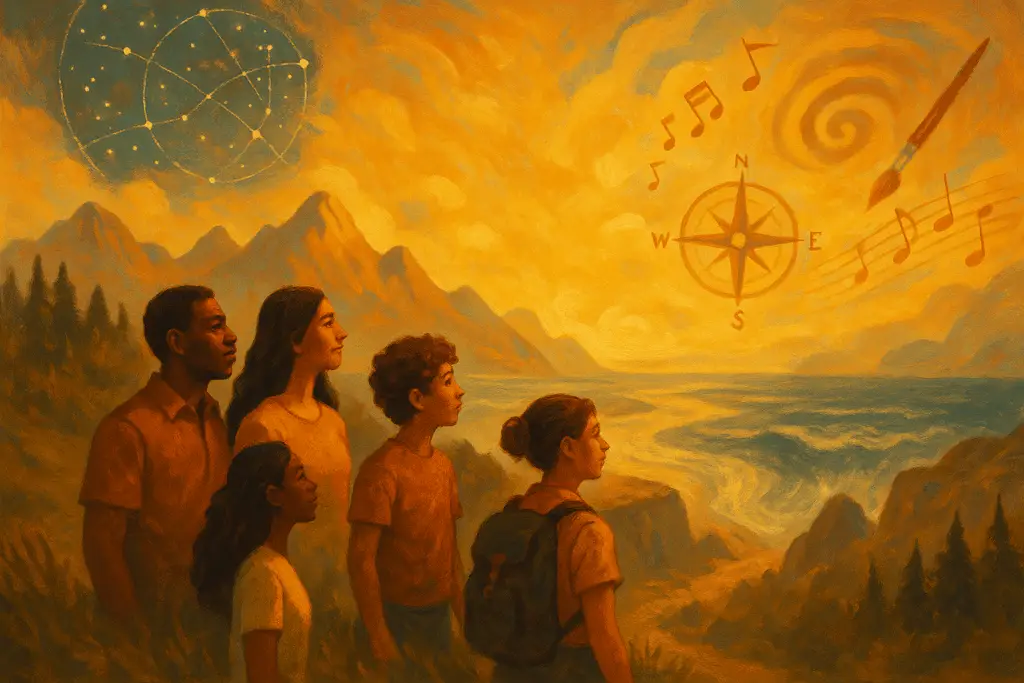
Human Nature, Exploration, and Curiosity
- Why do you think humans have an urge to explore, even when it involves risk or discomfort?
- Can you remember a time when you felt the urge to explore something new, even if it was outside your comfort zone? What motivated you?
- How do you satisfy your own curiosity in everyday life? What kinds of things make you want to learn more or go further?
- In what ways does exploration, whether scientific, artistic, or geographical, shape who we are as individuals and as a species?
- How might our drive to explore new places be both a strength and a weakness for humanity?
How do movies, TV, and other parts of pop culture portray curiosity, and have these stories changed or reinforced your own sense of wonder about the universe?
Art, Science, and Inspiration
- How are art and science similar in their goals and societal impacts?
- Why might art be considered as essential to humanity as scientific discovery or technological progress
- Has a piece of art, music, or science ever changed how you see the world or inspired you to try something new? What was it, and how did it affect you?
- In your life, do you see connections between creativity and problem-solving? Can you share an example
- Can you recall a pop culture moment—like a film, series, or song—that made you feel connected to the cosmos or imagine new futures? How did it influence you?
- Does space-themed entertainment’s popularity help more people get interested in real-world science, or does it risk making space feel “just fictional”?
- Can you think of examples where art has changed how people see the world or inspired new ideas about exploration?
- In what ways do our ideas about “exploration” and “discovery” reflect specific cultural or economic priorities, rather than being universal human drives? How might someone from a non-exploration-focused culture respond to the film’s depiction of space?
- Who gets to shape our collective dreams of space? What forms of art or inspiration are missing from these conversations — whose creative voices do we rarely hear?
- How might lived experiences, such as poverty or systemic exclusion, affect one’s ability to find inspiration in the space narrative?
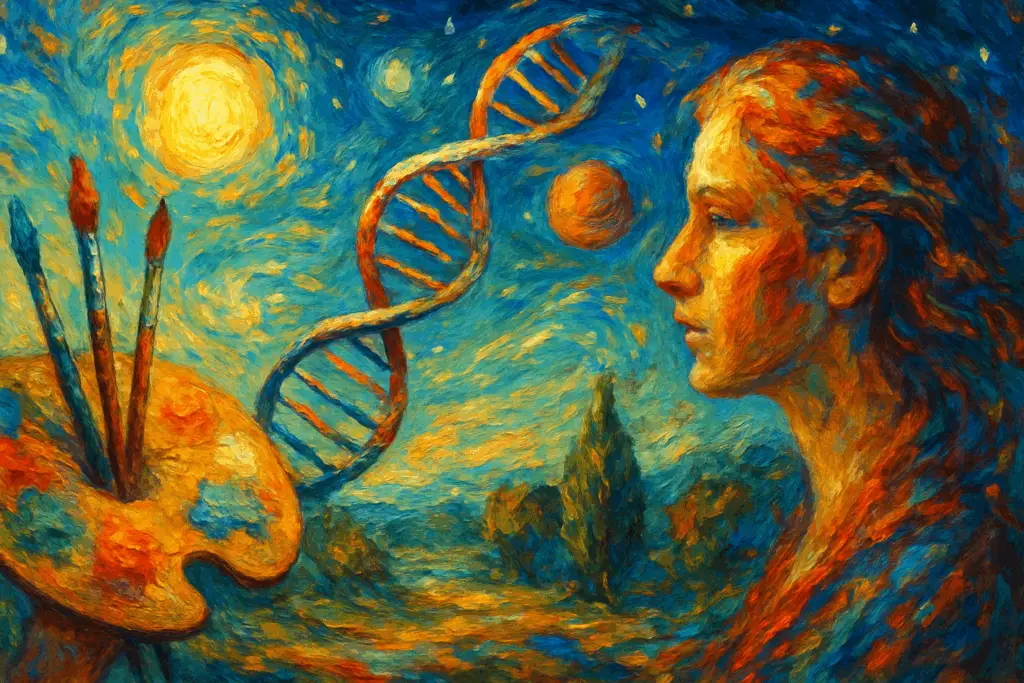

Art, Science, and Inspiration
- How are art and science similar in their goals and societal impacts?
- Why might art be considered as essential to humanity as scientific discovery or technological progress
- Has a piece of art, music, or science ever changed how you see the world or inspired you to try something new? What was it, and how did it affect you?
- In your life, do you see connections between creativity and problem-solving? Can you share an example
- Can you recall a pop culture moment—like a film, series, or song—that made you feel connected to the cosmos or imagine new futures? How did it influence you?
- Does space-themed entertainment’s popularity help more people get interested in real-world science, or does it risk making space feel “just fictional”?
- Can you think of examples where art has changed how people see the world or inspired new ideas about exploration?
- In what ways do our ideas about “exploration” and “discovery” reflect specific cultural or economic priorities, rather than being universal human drives? How might someone from a non-exploration-focused culture respond to the film’s depiction of space?
- Who gets to shape our collective dreams of space? What forms of art or inspiration are missing from these conversations — whose creative voices do we rarely hear?
- How might lived experiences, such as poverty or systemic exclusion, affect one’s ability to find inspiration in the space narrative?
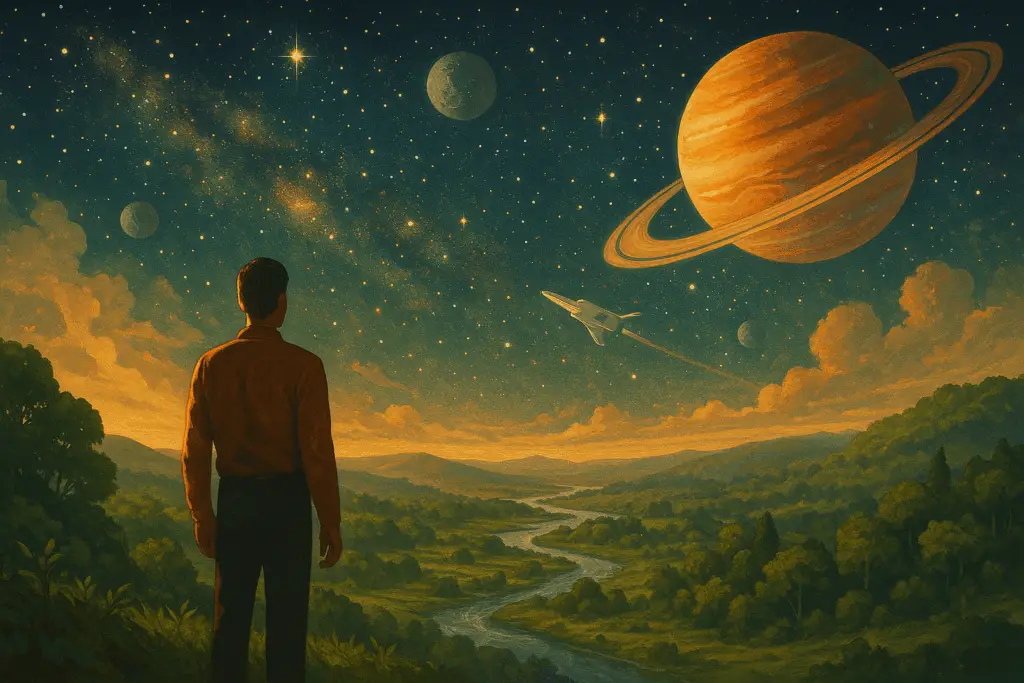
Ethics, Responsibility, and Decision-Making
- What responsibilities do humans have when exploring new frontiers, such as space?
- How can we avoid repeating the mistakes of past explorations, such as exploitation or environmental harm, as we move into space
- What ethical risks arise if we export Earth’s social, economic, or environmental problems to space? What does “responsibility” mean from the perspective of communities that may never participate in space travel?
- How are “mistakes” and “progress” defined differently across cultures? How might the risks of space exploration be experienced or interpreted by different groups?
- Should there be limits on what humanity is allowed to do in space? Who should decide these limits?
- Is it ethical to devote resources to space while many people on Earth struggle to survive? Who makes such decisions, and how can broader voices join this conversation?
- When you face a big decision, how do you weigh the risks and rewards? Can you think of a time when taking risks led to something valuable?
- Have you ever had to consider the impact of your actions on others or the environment? What did you do, and what did you learn?
- Think about the “Prime Directive” from science fiction like Star Trek. Do pop culture ethics like these influence honest conversations about right or wrong in space? Should they?
- How do stories from movies, books, or games shape our idea of what is “ethical” or “unethical” in space settlement and exploration?
Cooperation, Community, and Global Perspectives
- Why is international cooperation essential in space exploration?
- What challenges make it hard for countries to work together in space, and how might these be overcome?
- What existing economic, cultural, or political barriers hinder genuine global cooperation in space, and how might these intensify rather than diminish as we expand into space?
- The film often says “we,” but who is included and not in this “we”? How would someone outside American or elite academic circles answer the same questions posed in the film?
- Looking at the ISS as an example, what are the limits and pitfalls of international space collaboration, and can this model be scaled up?
- How can space exploration help us see ourselves as part of a global community rather than separate nations
- Describe a time when working with others from different backgrounds helped you achieve a goal or see things differently.
- How do you think your community could benefit from more collaboration or sharing of ideas?
- Have you noticed examples in pop culture where people from different cultures or nations work together in space? How do these stories affect your views on real-world cooperation?
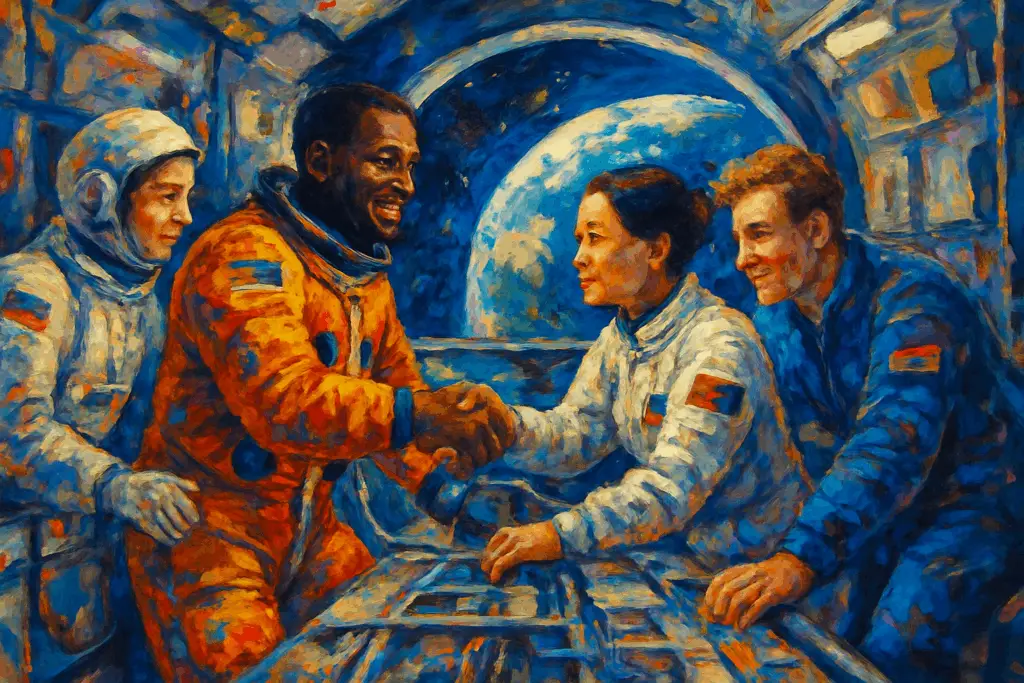

Cooperation, Community, and Global Perspectives
Why is international cooperation essential in space exploration?
What challenges make it hard for countries to work together in space, and how might these be overcome?
What existing economic, cultural, or political barriers hinder genuine global cooperation in space, and how might these intensify rather than diminish as we expand into space?
The film often says “we,” but who is included and not in this “we”? How would someone outside American or elite academic circles answer the same questions posed in the film?
Looking at the ISS as an example, what are the limits and pitfalls of international space collaboration, and can this model be scaled up?
How can space exploration help us see ourselves as part of a global community rather than separate nations?
Describe a time when working with others from different backgrounds helped you achieve a goal or see things differently.
How do you think your community could benefit from more collaboration or sharing of ideas?
Have you noticed examples in pop culture where people from different cultures or nations work together in space? How do these stories affect your views on real-world cooperation?
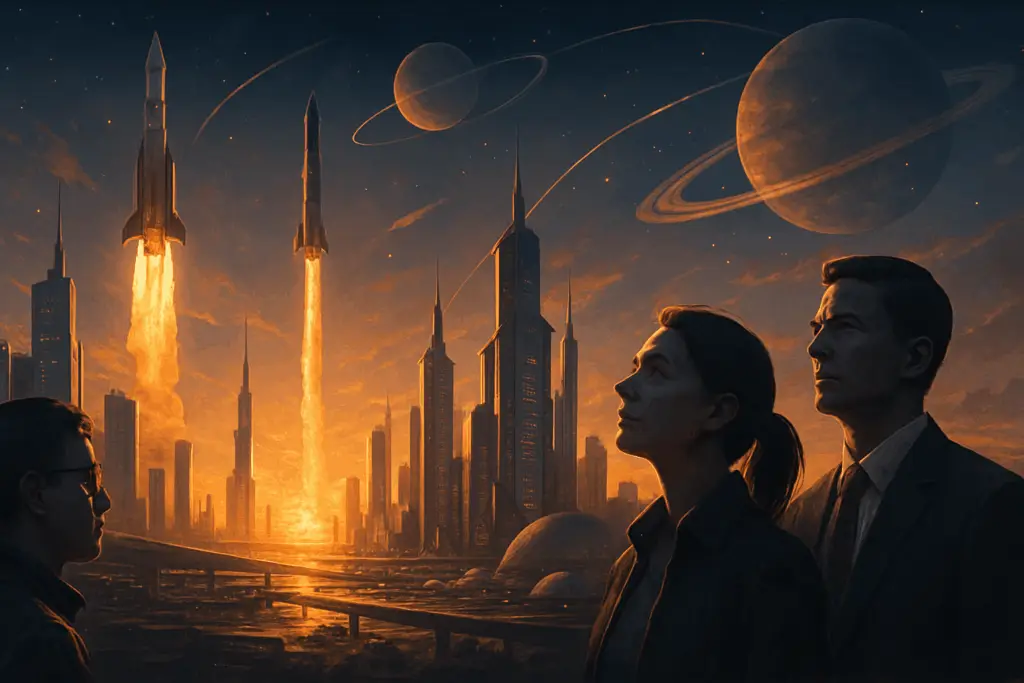
Technology, Risk, and the Future
- How might seeing Earth from space change our thoughts about our planet and ourselves?
- In what ways can learning about other planets, like Mars, help us better understand and protect Earth?
- Has learning about other cultures, places, or people ever changed how you view your own identity or community?
- What stories, traditions, or beliefs from your background shape your thoughts about exploration or the unknown?
- How do stories, myths, and cultural traditions about the stars influence our view of space and exploration?
- Is space for everyone, or is it, so far, only for a select few? What would authentic belonging look like for people systematically excluded or marginalized?
- How do concepts like music, culture, and identity truly translate, or not translate, across time, space, and social boundaries? When do so-called universal claims erase essential differences?
- How might someone living on less than $2 a day or from a non-Western background see their place—or lack of place—in the space in the future depicted in popular media and films?
- Are there specific characters, franchises, or stories in pop culture that you think have shaped society’s vision of what it means to be interplanetary or space-faring?
- How might the stories and perspectives we see in pop culture help include more voices and experiences, or risk leaving some out, in the story of humanity’s future in space?
Identity, Perspective, and Belonging
- How might seeing Earth from space change our thoughts about our planet and ourselves?
- In what ways can learning about other planets, like Mars, help us better understand and protect Earth?
- Has learning about other cultures, places, or people ever changed how you view your identity or community?
- What stories, traditions, or beliefs from your background shape your thoughts about exploration or the unknown?
- How do stories, myths, and cultural traditions about the stars influence our view of space and exploration?
- Is space for everyone, or is it, so far, only for a select few?
- What would authentic belonging look like for people who have been systematically excluded or marginalized?
- How do concepts like music, culture, and identity truly translate (or not) across time, space, and social boundaries?
- When do so-called universal claims erase essential differences?
- How might someone living on less than $2/day, or from a non-Western background, see their place, or lack of place, in the space “future” depicted in popular media and films?
- Are there specific characters, franchises, or stories in pop culture that have shaped society’s vision of being “interplanetary” or “space-faring”?
- How might the stories and perspectives we see in pop culture help include more voices and experiences, or risk leaving some out, in the story of humanity’s future in space?
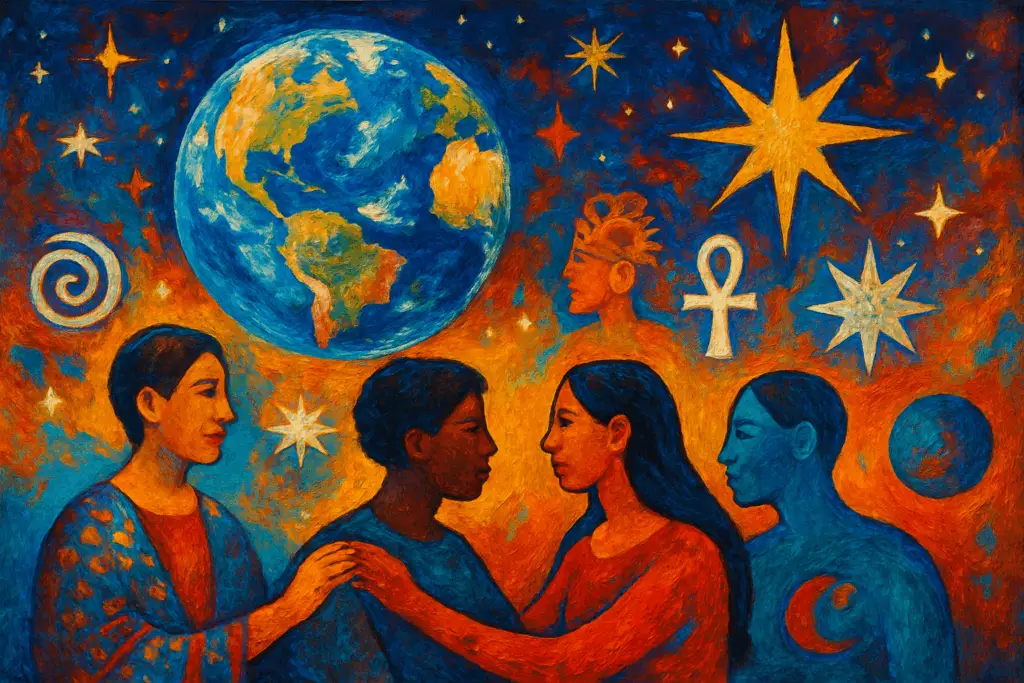
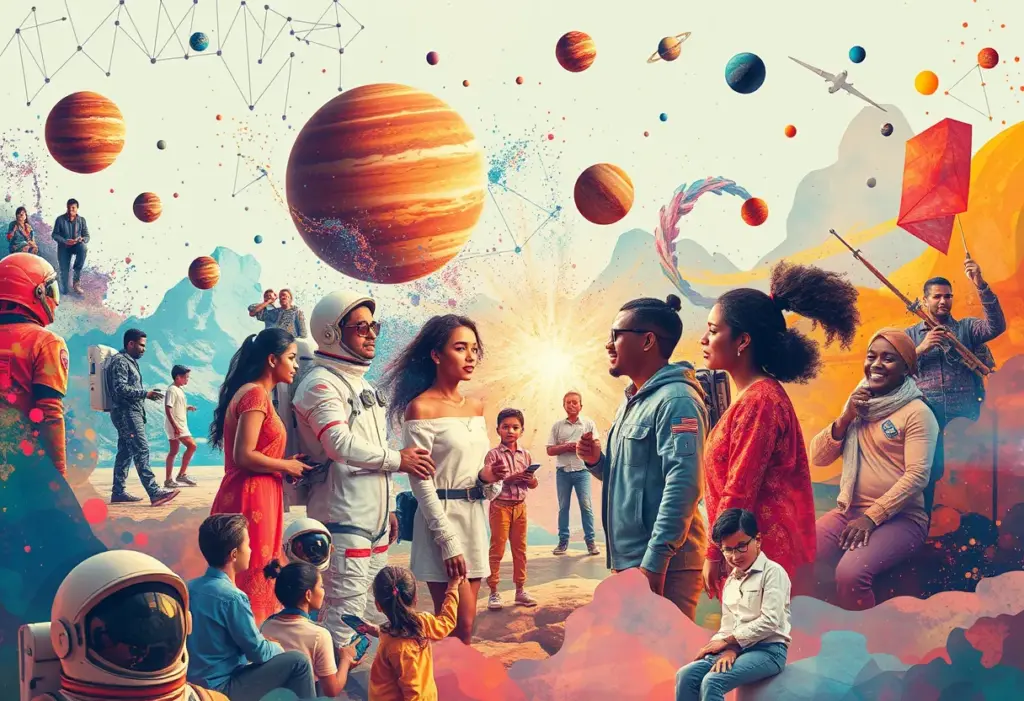
Imagination Without Borders
- Why must people from different backgrounds and skill sets be involved in space exploration
- How can broad perspectives lead to better solutions and discoveries as we explore new frontiers?
- What role does your culture or background play in your thinking about space and exploration?
- How does your imagination influence the choices you make or the goals you set for yourself?
- What role does imagination play in scientific and technological breakthroughs? Do you have examples where something dreamed up in fiction later became reality?
- Do you believe humanity will ever become a truly interplanetary species? Why or why not?
- How do you imagine life might change if humans settle on other planets?
- How would you like to see space exploration depicted in the future? What stories still need to be told?
- What kinds of futures are missing from this film? How can we better include the hopes and fears of people with no voice in today’s conversations about space?
- How do we balance big dreams — like interplanetary life and collective progress — with critical reflection on history, inequality, and ongoing harms?
- How do colonial legacies and ideas about “exploration” shape our visions for space, and what might a truly decolonized interplanetary future look like?

Identity, Perspective, and Belonging
- How might seeing Earth from space change our thoughts about our planet and ourselves?
- In what ways can learning about other planets, like Mars, help us better understand and protect Earth?
- Has learning about other cultures, places, or people ever changed how you view your identity or community?
- What stories, traditions, or beliefs from your background shape your thoughts about exploration or the unknown?
- How do stories, myths, and cultural traditions about the stars influence our view of space and exploration?
- Is space for everyone, or is it, so far, only for a select few?
- What would authentic belonging look like for people who have been systematically excluded or marginalized?
- How do concepts like music, culture, and identity truly translate (or not) across time, space, and social boundaries?
- When do so-called universal claims erase essential differences?
- How might someone living on less than $2/day, or from a non-Western background, see their place, or lack of place, in the space “future” depicted in popular media and films?
- Are there specific characters, franchises, or stories in pop culture that have shaped society’s vision of being “interplanetary” or “space-faring”?
- How might the stories and perspectives we see in pop culture help include more voices and experiences, or risk leaving some out, in the story of humanity’s future in space?